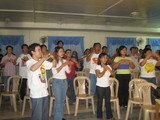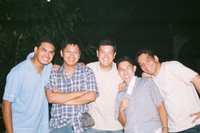
1 November 2006: Feast of All Saints
Matthew 5, 1-12 for All Souls and All Saints Day
The Gospel today speaks about practicing what we preach. But there are things which we practice but do not know why we preach it. For example, we come to Sunday mass but we totally do not understand what the mass really means. The same applies to our practice of commemorating All Souls Day and All Saints Day. We come to the cemeteries without actually knowing why we go and visit the dead. Media commercializes these two important practices by putting in the Western season of Halloween: Television shows like Eat Bulaga! and various commercial establishments wore Halloween costumes as themes, and many of us associate November 1 & 2 to horror stories of ghosts. I believe Halloween is an empty tradition. I shall therefore embark on an explanation of these two feasts using three perspectives that are easy to memorize.
First, the perspective of hope. When I visit the grave of my father whenever I find the chance to be home, the first thing I encounter is the reality of forever. At the grave, I talk to him about my life believing that he listens to me and he is present. Memories of him flood my mind, and in the remembrance of the times he spent with me and my family, he becomes present to me always. Death therefore as faith has it is never an end. In the preface for Christian Burial, it is said that life has not ended, but changed. The same thing with me: whatever challenges I face, I am always reminded not to lose hope, because in the end, there is life forever. And the proof is my father’s presence to me wherever I am, never anymore limited to physical presence. My father is with me always, all the time, wherever I go.
After grief and sorrow, I find myself feeling a deep joy: that I am happy for Daddy, that he is home in the arms of God. Oftentimes, our grief is about ourselves who are left behind, but that is a different story. We are also taught that Christians should be happy for someone else’s triumph --- the remedy for our envy and jealousy. And right at the grave, we are asked to go out of our own self-absorption and be happy for those who have gone ahead of us. That their life speaks about forever, about hope, about God.
Second, the perspective of love. Closely connected to the reality of forever, we are reminded that all our love, all our life finds meaning, direction, and goal in the desire to finally come home to the arms of God. It is not surprising therefore that true lovers promise to love each other until the end of time. This theme one finds in our literature, in our songs, and even in theater: “Hanggang sa Dulo ng Walang Hanggan”, West Side Story’s “Somewhere”, etc. We have known this reality since time immemorial. At the grave of those we love, we have found the meaning of love. My love for my father thus is beyond the grave: not even death will bring us apart.
Moreover, the grave reminds us of the things that are really important. Often we are swept with trivial things that do not last: temporal things that have become the source of our pride. These are our economic status, our educational background, our achievements, and our titles. If we look more closely, we are in a twisted world. The Gospel teaches us that all of these temporal things are to be used for service, in the love of others. Case in point: when we reach the highest educational attainment, post-graduate studies for example, it is expected that our expertise will make us great educators. But tragically, many of those with PhDs are the most boring and horrifying teachers or astutely proud individuals. Our faith tells us that the more we have, the more responsible we become of others: thus, they should be able to adapt to slow learners as well as to gifted individuals. Great service is carried until the next life; the others end at the grave. Proof: we remember the sacrifice of heroes, and are inspired to continue their legacy.
In addition, those who visit us when we die are the recipients of our love. They are the ones who matter. They are the ones whom we should dedicate our lives with. This is the direction of all our courses of action, our decisions, and our sacrifices. The grave redirects our lives.
Furthermore, I find myself connected with my ancestors. At the side walls of the 17th century
Finally, the perspective of faith. Every Sunday, the creed is recited to remind us of the basic tenets of our faith. In the creed, there is a phrase that is the source of the practice of commemorating the dead: the “communion of saints.” Just as I am connected with my ancestors, we who are pilgrims here on earth are connected with those who are still being purified and those who are already with God. And all those who are with God are holy people: they are saints, whether known or unknown.
And their presences are manifestations of God’s personal love for us. By their lives, we are guided. We are assured that we are never alone. I know my father is a saint: his life has been a good example to me and my family. His being father when I was a child was my first encounter of God’s fatherly love; and it continues to be until now, and in the future.
As we visit the graves of our loved ones, let us make our visit meaningful by keeping them in mind. And at the same time, re-evaluate our lives in the perspectives of hope, love and faith. And maybe ask just one question: what would I like people to remember me by when I die or what could be my contribution to the people who will succeed me. As we commune with them, we pray for them that they too pray for us.






